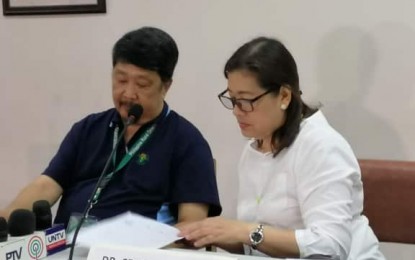
ASF IN DAVAO CITY. Department of Agriculture in Davao Region Director Ricardo Oñate Jr., (left) confirms that Davao City is no longer free from the African Swine Fever (ASF) after two barangays in Calinan District tested positive of the disease, during a press briefing on Thursday (Feb. 6, 2020). Beside him is Dr. Cerelyn Pinili, chief of the Davao City Veterinary Office. (PNA photo by Che Palicte)
DAVAO CITY -- The Department of Agriculture in Davao Region (DA-11) confirmed Thursday that this city is no longer free from African Swine Fever (ASF) after two barangays in Calinan District tested positive of the disease.
Engr. Ricardo Oñate Jr., regional director of DA 11, said in a press briefing that the blood samples of pigs from barangay Lamanan and Domingga which was collected and submitted to the Bureau of Animal Industry (BAI) on January 31 and February 3 tested positive of ASF.
“Just like what happened in Don Marcelino, we will also use the same protocols and we will be giving the PHP5,000 indemnification per swine to the affected hog raisers,” he said.
Oñate also said that they will impose the 1-7-10 protocol like what they did in Don Marcelino town in Davao Occidental where the first case of ASF in Mindanao occurred.
It means that in a one-kilometer radius from the site of infection or ground zero, hogs will be prohibited from entering or leaving the area, and the site is to eventually be depopulated.
Within a seven-kilometer radius, hogs would also be under surveillance with restricted movements, and blood testing would be done. For areas within the 10-kilometer radius from ground zero, mandatory monitoring and reporting of swine disease occurrences shall be implemented.
Dr. Cerelyn Pinili, chief of the City Veterinarians Office (CVO), said six blood samples coming from barangay Lamanan were submitted to BAI on January 31, three of which tested positive, while two blood samples submitted from Barangay Domingga also tested positive.
Earlier this year, Pinili said that their livestock technician reported that at least 16 pigs died in Brgy. Domingga, prompting them to submit the blood samples to BAI.
As to the population of live pigs, she said that about 1,400 heads of pigs in barangay Lamanan and 600 in barangay Domingga are subjected to culling.
Pinili also added that they have already placed the two barangays on lockdown to further prevent the spread of ASF.
“We will impose strict biosecurity on checkpoints. The live pigs, meat and other meat products cooked or fresh coming from these barangays will no longer be transported outside,” she added.
Pinili assured that that affected hog raisers in Calinan, specifically the villages of Dominga and Lamanan, will get assistance from the city government.
Aside from the assistance from DA-11, Pinili said that the city government will also buy all pigs in the two barangays, including the sucklings, to help the hog raisers cope with their losses.
“We will buy the pigs at PHP5,000 per head including the sucklings plus an additional amount for the per kilo live weight of the culled pig,” she said.
However, Pinili clarified that the ASF case in the said barangays will not affect the demand for pork meat since there several commercial piggeries supplying the city.
“For the consumers, to make sure that the meat is safe, look or demand to see the meat inspection certificate,” she added.
Pinili said that they will intensify their surveillance and monitoring, especially in the neighboring villages to avoid the spread of the disease. She also reminded the farmers to adhere to good animal husbandry practices for disease prevention.
She also reiterated their call to avoid swill feeding which may contain infected animal product which will be transferred to their swine. (PNA)
